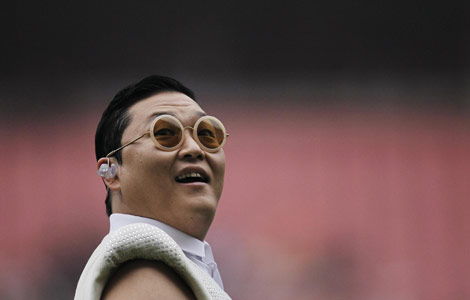In with old and in with new
Updated: 2013-06-24 13:47
By Raymond Zhou (China Daily)
|
|||||||||||
Even if the tunes from the model operas are endlessly hummable, at least to one whole generation, I don't consider it a good precedent in reviving the glory of Peking Opera. If I have to choose between the hoary repertory of palace drama and the vitality of revolutionary operas, I would rather stick with the former. The latter is an anomaly of the times.
Traditional operas are stagnant partly because they are cut off from modern necessities and sensibilities. In the old days, people tended to rely on them for a regular diet of history lessons; nowadays that mantle is picked up by television serial dramas. Another shift in taste is, people used to prefer drama sung than spoken, and now the young generation may like plays and music, but often squirm when seeing the two forms fused. That may explain the lack of popularity in China of the musical genre.
Good-intentioned but misguided efforts to popularize Peking Opera include the initiative to make a dozen arias suggested listening material for high-school students. That may serve to break down the mystique enshrouding the art form, but it is unlikely to convert many of them into true lovers. Exposure is certainly not the biggest hurdle. There are special television channels devoted to traditional opera that any one who cares to can tune into to get their fix.
It is the "easing into it" that will help youngsters with the learning and appreciation process. And that's where the documentary may be an effective aid. It demystifies the art form while at the same time placing it under a thick halo.
To a certain extent, Western classical music, including opera, is in a similar dilemma. But it has its share of stars who can help sell out shows and entice new audiences. Peking Opera needs its equivalent of Leonard Bernstein, whose televised lectures and demonstrations spawned a whole generation of classical music aficionados. As it stands, Peking Opera does not have a star big enough to cross over to the general public. All we have is a few pop singers who occasionally foray into the Peking Opera realm and snatch a few elements, such as melodies and makeup, to spruce up their tradition-embracing credentials.
Which is better than nothing. It hints to young people that Peking Opera can be chic and that it's not just for their parents and grandparents. But sometimes this kind of practice is carried too far, for example, when a group of scantily clad girls don Peking Opera headgear in a set of photos for a modeling contest.
To find a true audience of the younger demographic, Peking Opera has got to innovate in both form and content. Given Chinese loathing for tinkering with tradition, it would be unwise to "update" the old repertory to new versions. Keep them as they have always been. Sing and dance exactly as Mei Lanfang, the great master, did on stage. But create new shows that expand its musical idiom and narrative scope.
A few years ago, Chinese-American director Chen Shizheng staged a new version of Farewell, My Concubine in Beijing, incorporating a multimedia backdrop and modern dance, among other new elements. The production was lambasted in the press. But Red Cliff, the Three Kingdom legend produced by the National Center for the Performing Arts, was met with universal acclaim. It's both old and new. The story, the tunes and the costumes follow the old conventions, but the presentation and even some of the messages are new. There is an anti-war theme in the grand finale. Now, that is something the modern audience can resonate with.
For more X-Ray, click here
Related Stories
Keeping the spirit 2013-06-17 15:48
Smart money on horseplay 2013-06-08 14:00
Wuzhen dares to dream big 2013-05-20 14:31
Log on, tune in, drop out 2013-05-06 11:08
Pay for free lunch 2013-03-31 17:55
Hip is a 'smart' start 2013-03-25 13:40
Today's Top News
Shares deepen downward spiral as banks sink
A growing rift
London and Beijing agree currency swap
EU talks on failing banks break down
Mandela's condition critical
US 'stole' China's statistics
Mountaineers killed in Pakistan
Foreign firms eye new 'opening-up'
Hot Topics
Lunar probe , China growth forecasts, Emission rules get tougher, China seen through 'colored lens', International board,
Editor's Picks

|

|

|

|

|

|





